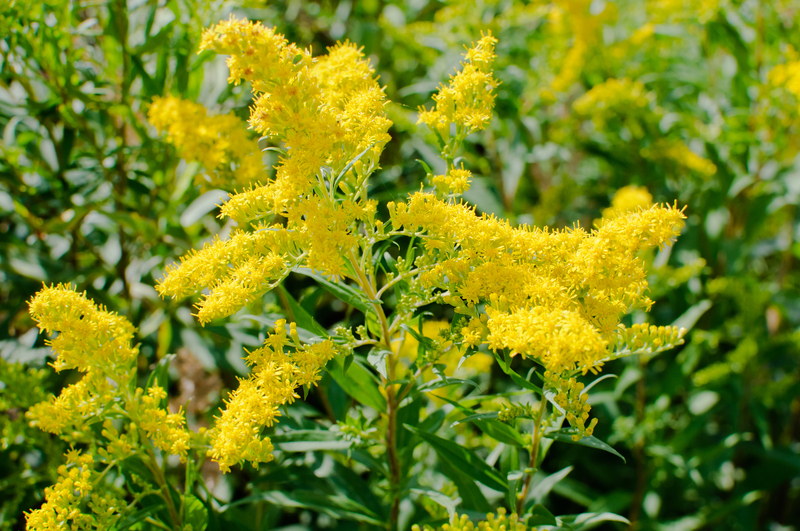Beginner's Guide to Thriving Herb Gardens
Posted on 05/10/2025
Beginner's Guide to Thriving Herb Gardens
Herb gardening is one of the most rewarding and accessible forms of home gardening. Whether you have a small windowsill, a balcony, or a spacious backyard, cultivating a flourishing herb garden is entirely within your reach. This beginner's guide to thriving herb gardens aims to equip you with all the essential knowledge and handy tips to start growing aromatic and flavorful herbs at home.

Why Start a Home Herb Garden?
- Year-round access to fresh, organic herbs for cooking
- Cost-effective compared to buying store-bought herbs
- Adds beauty and greenery to your living space
- Herbs are easy to manage and require minimal space
Whether you wish to season your homemade dishes, brew medicinal teas, or simply enjoy the therapeutic nature of gardening, starting your own herb garden for beginners is the perfect hobby.
Choosing the Right Location for a Thriving Herb Garden
Sunlight Exposure: Most herbs thrive in locations that receive at least six hours of direct sunlight daily. Position your garden in the sunniest spot available, whether indoors on a south-facing windowsill or outdoors in the garden or balcony.
Good Drainage: Herbs do not like soggy roots. Ensure your herb containers or planting beds have proper drainage holes. Raised beds are also an excellent way to ensure excess water drains away.
Easy Access: The closer your garden, the more likely you are to use and care for your herbs. Choose a spot that's convenient to your kitchen for regular harvesting.
Indoor vs. Outdoor Herb Gardens
- Indoor Herb Gardens: Great for small spaces and year-round growth. Place near windows, use grow lights if needed.
- Outdoor Herb Gardens: Ideal for larger harvests and a wider range of herbs. Consider raised beds, containers, or designated garden patches.
Selecting Herbs for Beginner Gardeners
When starting your herb garden as a beginner, choose herbs that are hardy, low-maintenance, and regularly used in your kitchen. Here are some top picks:
- Basil: Delicious in pesto, Italian dishes, and salads.
- Parsley: Versatile garnish, rich in vitamins.
- Mint: Refreshing for teas, desserts, and cocktails.
- Cilantro (Coriander): Essential for salsas and Asian cuisine.
- Chives: Mild onion flavor, great for eggs and salads.
- Thyme: Aromatic in soups, meats, and stews.
- Oregano: Staple for Mediterranean dishes and pizza.
- Rosemary: Woody flavor, wonderful with roasted meats and vegetables.
Tip: Start Small!
Begin with 3-5 easy herbs that you frequently use. Once you're comfortable, expand with more exotic or specialized varieties.
Starting Your Herb Garden: From Seeds or Seedlings?
Beginners often wonder whether to grow herbs from seeds or buy young plants (seedlings). Here are the pros and cons:
-
Seeds:
- More economical and offer a wide selection of varieties.
- May require additional care during germination and transplanting.
- Great for mint, basil, dill, chives.
-
Seedlings/Transplants:
- Quicker harvest--best for basil, rosemary, parsley, sage.
- Less risk of seedling failures.
- Ideal for beginners who want instant gratification.
Planting Your First Herb Garden
Containers, Raised Beds, or In-Ground?
- Container Herb Gardens: Perfect for patios, balconies, or window sills. Use pots with drainage holes and quality potting mix.
- Raised Beds: Improve soil quality and drainage. Keep herbs organized and accessible.
- In-Ground: For larger spaces. Make sure to amend soil for good drainage and fertility.
Soil Preparation
Good soil is the foundation of a thriving herb garden. Use a well-draining, loose soil rich in organic matter. For containers, select a high-quality potting mix. Amend garden beds with compost or aged manure. Herbs like slightly alkaline to neutral soil (pH 6.0-7.5).
Planting Techniques
- Spacing: Give each herb enough room to grow. Plant basil and parsley 6-8 inches apart, rosemary and mint about 18 inches apart.
- Planting Depth: Sow seeds as directed on the packet. Transplant seedlings at the same soil level as in their pots.
- Labeling: Use labels to remember what and where you planted!
Watering: How Much is Enough?
Consistent, moderate watering is key for healthy herb gardens. Over-watering can cause root rot, while under-watering leads to wilting.
- Soil Check: Insert your finger an inch into the soil. Water if dry; wait if moist.
- Morning Watering: Watering in the morning helps prevent fungal diseases.
- Container Herbs: Containers dry out faster and may need more frequent watering.
- Mulching: Add a light layer of mulch to garden beds to retain soil moisture and suppress weeds.
Maintaining and Nurturing Your Herb Garden
Fertilizing
Herbs don't need heavy fertilization. Over-fertilizing can reduce the concentration of flavorful oils. A monthly application of balanced, organic fertilizer or compost is typically sufficient.
Pruning and Pinching
- Encourage bushier growth by regularly pinching off the tips of your herbs.
- Harvest early and often to stimulate new leaf production.
- Remove flower buds (especially for basil and mint) to prolong the leaf harvest and prevent bitterness.
Dealing with Common Pests and Problems
Most herbs are naturally resistant to pests, but keep an eye out for aphids, spider mites, and mildew.
- Natural solutions: Spray with diluted neem oil, introduce ladybugs, or rinse leaves with water to deter pests.
- Avoid harsh pesticides on edible herbs.
Overwintering and Seasonal Care
- Perennials like rosemary, thyme, and chives can survive mild winters but may need mulch protection or to be brought indoors in colder regions.
- Annuals (e.g., basil, cilantro) need replanting each spring.
Harvesting Your Herb Garden Properly
Proper harvesting is essential for the health and longevity of your herbs. Pinch or snip the top leaves, using sharp scissors or pruning shears.
- Harvest in the morning after dew dries, when oils and flavors are most concentrated.
- Don't remove more than 1/3 of the plant at one time to avoid stressing it.
- Use or store immediately; herbs are most aromatic just after harvest.
Preserving and Storing Your Herbs
If your herb garden thrives, you'll often have more than you can use. Preserve the surplus using these methods:
- Drying: Tie stems in small bunches and hang upside-down in a warm, dry place. Store dried leaves in airtight jars away from light.
- Freezing: Chop herbs and freeze in ice cube trays with water or olive oil for instant flavor boosts.
- Infused Oils & Vinegars: Use fresh herbs to flavor oils or vinegars for salad dressings and marinades.
Creative Ways to Incorporate Homegrown Herbs
- Culinary Uses: Season soups, stews, salads, dressings, pastas, and roasts.
- Teas and Tisanes: Brew refreshing beverages with mint, lemon balm, or chamomile.
- Herb Butters & Spreads: Blend chopped herbs with softened butter or cream cheese.
- Baths & Skincare: Infuse baths with lavender, rosemary, or calendula for relaxation.
- Natural Air Fresheners: Bundle herbs or make scented sachets for closets and drawers.
Common Mistakes to Avoid in Herb Gardening
- Overwatering or underwatering your herbs
- Planting sun-loving herbs in shade (or vice versa)
- Ignoring soil quality and drainage needs
- Overcrowding plants, preventing good air circulation
- Neglecting to harvest and prune regularly
Being attentive to these pitfalls will help in maintaining a truly thriving indoor or outdoor herb garden.
Frequently Asked Questions (FAQs) About Growing Herbs
Can I grow herbs indoors all year round?
Yes! Most herbs do well on sunny windowsills or under grow lights year-round. Water and fertilize as needed, and rotate pots for even growth.
What are the easiest herbs for beginners?
Basil, parsley, mint, chives, and oregano are particularly beginner-friendly herbs that germinate quickly and are forgiving of minor mistakes.
What size pots are best for herbs?
Start with 6- to 8-inch pots for most herbs. Larger, deeper pots are ideal for woody herbs like rosemary or sage.
How do I know when to water?
Test the soil by touch - water only when the top inch feels dry. Yellowing leaves can indicate overwatering.
Can I plant different herbs together?
Most herbs thrive together, but mint should be grown separately because it spreads aggressively and can outcompete neighbors.

Your First Step Toward A Thriving Herb Garden
Growing your own flourishing herb garden is a simple and satisfying way to enjoy fresh flavors and natural beauty every day. With a little planning and regular care, even novice gardeners can yield bountiful harvests. Remember to start small, choose the right varieties for your space, and enjoy the process as you learn and grow.
Start today and transform your meals, your home, and your gardening skills with a thriving, beginner-friendly herb garden!
Further Reading and Resources
- Local Gardening Clubs and Workshops: Connect with others growing herbs in your area for support and shared knowledge.
- Online Communities: Forums and social media groups offer invaluable advice for herb garden beginners.
- Recommended Books:
- Herbs: The Complete Gardener's Guide by Patrick Lima
- The Cook's Herb Garden by Jeff Cox and Marie-Pierre Moine
Happy Herb Gardening!
Latest Posts
Transforming Organic Waste into Soil Fertility
Beginner's Guide to Thriving Herb Gardens
Designing a Magical Garden for Young Explorers

